On July 16, 2025, European Commission President Ursula von der Leyen presented a sweeping proposal for the 2028–2034 Multiannual Financial Framework (MFF), valued at €2 trillion—a dramatic increase from the €1.21 trillion budget adopted in 2020. The plan aims to reshape the EU’s financial architecture to better respond to geopolitical instability, climate challenges, and economic competitiveness.
🧭 Strategic Budget Structure
The new MFF is built around three core pillars:
| Pillar | Allocation | Focus Areas |
|---|---|---|
| National & Regional Partnerships | €865 billion | Agriculture, fisheries, cohesion, social policy |
| European Competitiveness Fund | €410 billion | Research, innovation, clean tech, defence |
| Global Europe | €200 billion | Foreign policy, humanitarian aid, Ukraine |
An additional €100 billion is earmarked for Ukraine’s recovery and EU accession support, building on the €50 billion Ukraine Facility approved in 2024.
🔄 Key Reforms and Innovations
- Programme Consolidation: Reduces 52 existing programmes to 16, streamlining administration and enabling faster crisis response.
- Crisis Reserve Mechanism: Introduces a flexible €400 billion loan facility for member states during unforeseen emergencies.
- Rule of Law Conditionality: All funding is tied to compliance with EU democratic standards, targeting concerns over governance in Hungary.
- New Revenue Streams: Proposes EU-wide levies on electronic waste, tobacco, and corporate profits to raise up to €58.5 billion annually, supplementing member state contributions.
⚖️ Political and Economic Implications
The budget reflects lessons from von der Leyen’s first term, shaped by the COVID-19 pandemic, Russia’s invasion of Ukraine, inflation, and global trade tensions. It prioritizes flexibility, strategic autonomy, and investment in competitiveness, aligning with recommendations from former Italian Prime Minister Mario Draghi on reversing Europe’s economic decline.
However, the proposal faces resistance:
- Southern and Eastern member states are concerned about reduced agricultural and cohesion funding.
- Western and Northern countries support the shift toward innovation and defence.
- European Parliament members have criticized the lack of transparency and fear a real-terms spending freeze due to inflation and debt repayments.
The Commission estimates €24 billion annually will be needed to repay COVID-era recovery borrowing starting in 2028.
🗣️ Von der Leyen’s Vision
“It is more strategic, more flexible, more transparent. We are investing more in our capacity to respond and more in our independence,” von der Leyen stated during the budget presentation.
The proposal now enters a contentious negotiation phase with the European Parliament and Council of the EU, with final adoption expected before January 2028.
You can explore the full proposal on the European Commission’s official site.



